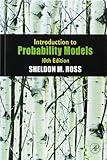Found in 2 comments on Hacker News
btown · 2015-07-21
· Original
thread
Like most fields, it depends on your definition of "studied." If you want to push the envelope in theoretical non-applied research, you're going to want to learn analysis & measure theoretic probability theory. If you want to apply existing techniques, read (well-written) papers and code up the algorithms you find there, you can get away with undergraduate-level linear algebra & probability knowledge - Bayes' rule, expectations, independence, the general ability to think about random variables (and matrices thereof) as values that can be transformed and combined. And of course, you can fire up a classifier in SciPy without knowing any of this at all. But that's stretching the definition of "studied" quite a bit!
I personally went into a graduate-level probabilistic machine learning course with probability knowledge consisting of an undergraduate course that followed Ross http://www.amazon.com/Introduction-Probability-Models-Tenth-... - so there's certainly no need to have been a math major. But if you've never dealt with random variables whatsoever, you'll hit a wall following research from the last 20 years.


[1] https://www.amazon.com/JavaScript-Definitive-Guide-Activate-... [2] https://www.amazon.com/Thinking-Fast-Slow-Daniel-Kahneman/dp... [3]https://www.amazon.com/Introduction-Probability-Models-Tenth... [4] https://www.amazon.com/Hackers-Black-Book-Important-Informat...